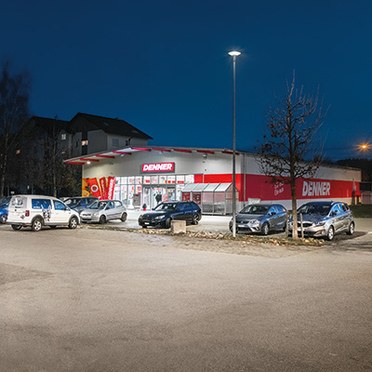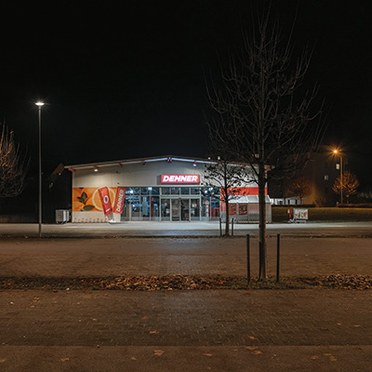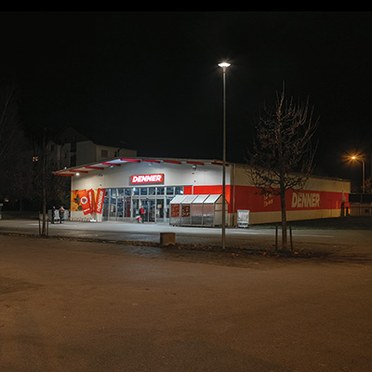Thorn's new NightTune technology impresses Denner in Amriswil
- Lamp efficacy
Lamp efficacy
Ensuring the lamp efficiently converts electricity into light (lm/W).
- Ballast classification
Ballast classification
Controlling the electricity supply to the lamp (Energy Efficiency Index).
- Luminaire distribution
Luminaire distribution
Controlling light emission using optics which bend and shape the light to the correct location.
- System efficacy
System efficacy
Combining optical and thermal control within the luminaire (luminaire lm/W).
- Presence/absence detection
Presence/absence detection
Providing lighting only when it’s needed.
- Daylight detection
Daylight detection
Reducing waste light during daylight hours.
- Constant illuminance
Constant illuminance
Producing the correct lighting levels for the duration of the maintenance period.
- Task-scene setting
Task-scene setting
Allowing the user to set scenes and adapt the lighting to different tasks.
- Timed off
Timed off
Automatic cut-off to turn all lights off during unoccupied hours.
- Task lighting
Task lighting
Lighting task areas with the correct amount of light.
- Zoning of lighting
Zoning of lighting
Zoning lighting in accordance to occupancy patterns or window location.
- Maintenance schedule
Maintenance schedule
Tailoring maintenance schedules in accordance to product age, performance and environment.
- Waste light
Waste light
Eliminating waste light which does not hit the intended target.
- Reflectance
Reflectance
Taking advantage of light which is reflected from the surface within the space.
- Visible smart metering
Visible smart metering
Enabling results of actions to be quickly seen as increased or decreased energy use to encourage responsible energy consumption.
What started as a small shop in 1860, Denner AG has now become one of the leading discounters in Switzerland. Measured by turnover, it is the third largest food retail company in Switzerland. Since the end of 2009, the public limited company has been fully owned by the Migros Cooperative. Not only does the discounter focus on a good price/performance ratio and pleasant shopping atmosphere, but also on a sustainable future. That's why the markets and outside areas are regularly renovated, in order to ensure that the technology is state-of-the-art throughout. The Zumtobel Group has had a long-standing partnership with Denner AG and was involved in the renovation of the Denner market in Amriswil which included both the entire market as well as the customer car park.
Future-oriented company philosophy and lighting solution
As a future-oriented company, it was important for Denner AG's sustainable corporate philosophy to be reflected in the new lighting. With Thorn, a subsidiary of the Zumtobel Group, a progressive solution was found for the car park, while the interior of the market was illuminated by Zumtobel. The existing car park was illuminated with 8 pole luminaires and Thorn was able to reduce this to just 4, meaning procurement costs as well as future energy and maintenance costs could be kept low. The Plurio post-top luminaire from Thorn with NightTune technology was selected.
Ines Ehrmann, project manager at Zumtobel Licht AG Switzerland, and responsible for the complete construction project in Amriswil, added: "Sustainability is a principle that significantly influences our corporate philosophy and we therefore deal with it daily. We are working together on meeting the objectives of our sustainability strategy. That's why it was also extremely important to us to offer our customer a lighting solution that also includes environmental aspects. Together with those responsible at Denner, we were not only able to offer the required energy saving, but also a pilot project that actively minimises light pollution with the new car park lighting from Thorn. Not only do we dim the light at night, but we also use very warm colour temperatures to protect the ecosystem at night if no customers are using the car park."
Light tailored to the environment and the situation
Plurio was the first product to be equipped with the NightTune technology. This technology duo not only meets the requirements of modern cities, but also takes into account all living things in the urban environment – both human and animal.
So what exactly does this technology do? NightTune is an autarkic, multi-level dimming system (MLD) that automatically adapts the light level emitted by a light fixture and its colour temperature to the corresponding night time and traffic density. It mixes light from warm and cool LEDs. By increasing and reducing the two LED groups separately, colour temperatures from warm 2200 K to a moderate 3000 K can be achieved at different brightnesses.
In the Denner car park, this works as follows:
When darkness falls, if there are still pedestrians and drivers in the car park, NightTune offers a moderate white colour temperature and the light is not dimmed. From about 8pm, when the market closes, the light output of the cool LEDs is reduced so that the light dims and, at the same time, a warmer light colour is produced. At dawn, when the shop opens and traffic increases again, the output of the cool LEDs increases to produce a brighter and cooler light that meets the higher safety requirements.
Focus on ecology, sustainability and durability
Thanks to NightTune, the light colour and luminous flux can be adapted directly to the individual needs of people and nature during the course of the night. Another positive side effect is the annual energy savings. Additionally, the lighting solution’s replacement was implemented at an attractive cost which will have paid for itself within 4 years. The Denner Amriswil project is an excellent example of a lighting solution that adapts to our environment and sheds light on ecology and sustainability in equal measure as well as the promise of a long life-span thanks to Thorn’s robust luminaires.



